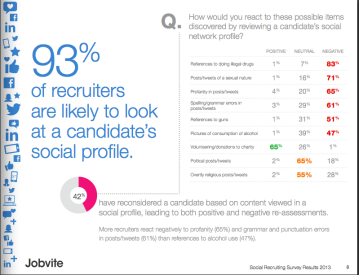Blog Archives
Branding Yourself for the Web
Posted by Halie Westphal
A symptom of the web is that often two social networks that are meant to be separate collide. As social media sites became more popular and attracted a variety of users, the social spheres of work, family, and friends collided. People responded by taming down their profiles so they would be acceptable to all audiences.
Some sites allow you control the information you put out into the world through privacy settings, others like a blog do not. Contrary to social media sites you do not have a specific group of friends that only you approve to see your content. With a blog run through WordPress and similar services your work is out there for anyone to see. This can cause some trouble depending on the type of content posted. Old post don’t simply disappear. “Most blogs automatically archive posts as they get pushed off the front page by newer posts.” Especially since digital documents stay around for a long time, if not forever, so it is not always as simple as hitting delete. Rettberg said “while most of what we post on Facebook may seem harmless, we should consider that it could be used in other context”
With a blog you have an invisible audience. A larger majority of readers are lurkers like me. Lurkers rarely participating in social media conversation, but we are still consuming the media. New research suggests there are 12 different social media personalities.
Since the audience that can view your content is anyone, you are forced to negotiate these audience and not post anything that would be too unacceptable to a network. Your online identity is extremely important. One of the first places people go to find out more information is the web, and they are doing it increasingly more to find out information about people. There is specific ways we present ourselves on the web. The term personal branding – the process in which we market ourselves to others – was coined once we realized that we needed to present ourselves positively to the rest of the world. What people find can affect your professional life, personal, and university acceptance.
 I have repetitively been told how important that it is that my profile has strict privacy settings in-case my future employers. What is posted today could impact your future. People are checking on what you have been up to, Kaplan’s survey showed that colleges are increasingly using Facebook and Twitter to recruit, furthermore of those admissions officers who look up their applicants 353 percent discovered something about an applicant that negatively impacted their application — a 218 percent increase over the previous year.
I have repetitively been told how important that it is that my profile has strict privacy settings in-case my future employers. What is posted today could impact your future. People are checking on what you have been up to, Kaplan’s survey showed that colleges are increasingly using Facebook and Twitter to recruit, furthermore of those admissions officers who look up their applicants 353 percent discovered something about an applicant that negatively impacted their application — a 218 percent increase over the previous year.
Also authenticity is more commonplace. Pseudo names to protect your personal identity aren’t attractive to readers, they want to know that there are connecting to a real person. So it wont do you much good to make a blog under a fake name because somehow it will be traced back to you. We tend to drop a few pieces of personal information in here and there. Combined they complete a whole profile of who we are. The different services we use always want to link to each other; connect through Facebook here and link to Twitter there. I have noticed that what I do on my cellphone connects to what I do on my computer, and then to my Xbox. If find this to be a bit weird, convenient in some ways I’m sure, but feels intrusive. There will no longer be borders between your online self and your offline self, both will be equability representative of yourself to the rest of the world for better or for worst.
Maybe you should check your online identity and make sure nothing surprising pops up.
Posted in Class
Tags: #en3177, colliding networks, Facebook, lurkers, personal branding, privacy, social media, social networks, web
Everything Has Gone Digital
Posted by Halie Westphal
Rettbergs ch. 3 had sent my mind spiraling about how the web has changed our lives forever. Social media has been changing our lives significantly since 2008 as we entered the bright new world of Web 2.0 Now that we have been thrown into this digital age where our smart phones are never more than a foot away, the web has been ingrained in our lives. Technology being intertwined in our everyday lives is a double-edged sword.
Speed is a main topic, we want it now and it better be fast. People can share information in a matter of seconds, like citizen media which major advantage is speed. I have found citizen media very intriguing. Whenever there has been a major news event, especially horrific ones such as the Boston Bombing, the first place I find out about it is Twitter.
The internet has shrunk space as well as time
Distance no longer a large barrier. people can be connected across the world. Almost anyone and everything can somehow been connected to the internet whether that be a photo of your dinner, a photo of you doing a keg stand, or even a photo of you at the beach on a day you called into work because you were “sick”. Out networks are colliding (will link to future post tonight). How should we respond to intruding role of the web?
The digital world cannibalizes time
In this Ted Talk Abha Dawesar “reflects on how time-warping technology, like social media and mobile devices, has changed our perception of our own personal narratives and perception. We live, instead, in what she calls the “digital now.”
In what ways has technology invaded your life? Time created a calculator to see how much time you have spent on Facebook.
Posted in Class
Tags: #en3177, Abha Dawesar, digital media, digital now, social media, technology, TED, web

